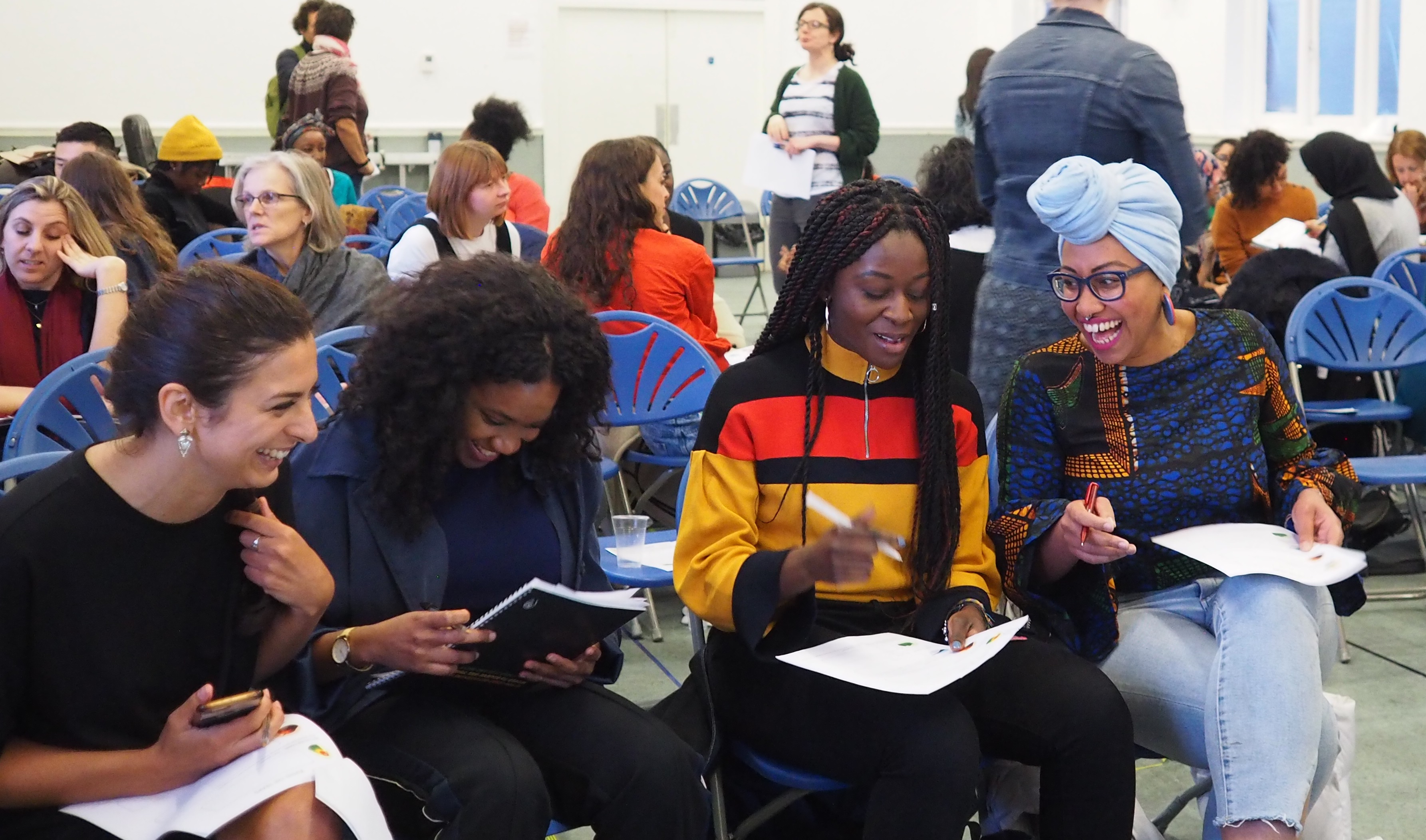Event: Challenging the charity-industrial complex through language
On by Tess Woolfenden
Exploring the dominant narratives within the development sector through participatory conversation

On 10th April, we hosted an event in Brixton, London called “Challenging the charity-industrial complex through language” with our allies at Medact and Framing Matters. We had some fantastic activists and campaigners speaking at the event, including human rights professional Natalie Armitage; Crissy from the Women of Colour Global Women’s Strike and Black Women’s Rape Action Project; Guppi Bola, Interim Director at Medact; Ralph Underhill founder of Framing Matters; and our very own Tess Woolfenden.
The evening brought together NGO workers, global South solidarity groups and grassroots activists to engage in debate about the dominant language used in the development sector – which is trapped in decades old practise of white-saviourism – as well as exploring what alternatives could look like.
Speakers Natalie and Crissy contributed incredibly powerful interventions, providing clear examples of the damaging language used in the sector…
“When we talk about ‘global north’ and ‘global south’ what we really mean is ‘colonisers’ and ‘colonised’” – Natalie Armitage
“Here is a perfect example of sanitising language – ‘voluntary returns’. What we really mean is pressure put on people to leave this country when they have every right to be here” – Crissie
…and linked the use of this language to wider issues of global North superiority and the role NGOs and other development actors have in maintaining this.
“Without the narrative of white-saviourism, global north superiority would end – what would this mean for the charity industry?” – Natalie
“If NGOs really want to change things, they need to do it on the basis of what people in the grass roots are demanding” – Crissie
Guppi echoed this emphasising that –
“…the language we use is part of a much wider issue” – Guppi
Tess shared the work of Health Poverty Action trying to deconstruct the colonialist narratives embedded within the work we do towards global justice and highlighted why we need to find an alternative.
“We need to find a way of communicating the issues we work on in a way that builds global solidarity and demands action on the root causes of poverty” – Tess
From amazing analysis from the panellists, the night moved towards practical solutions for those of us working for global justice. Ralph from Framing Matters introduced some of the common communication pitfalls that actors in the sector fall into, and asked attendees to think of some examples under each pitfall in small group discussions. Here is a glimpse into what we came up with –
Refutation Trap (Parrot) – when we repeat an opponent’s unhelpful position, even to refute it, we are still reinforcing it.
- “Poverty is not natural” – by saying this we are reinforcing that poverty is natural, instead we could say “poverty is created”
Contaminated Language Trap (Shark) – using language that brings to mind associations that are unhelpful to us. These can be contested (a word which has negative associations but which we might be able to reclaim) or toxic (a word that is too contaminated for us to use anymore).
- “Migrant” or “Asylum Seeker”
- “Welfare” or “Social Housing”
Although these terms have some positive associations, they also have many negative ones due to unhelpful media coverage. Instead, we could say “people seeking refuge” or “vital social efforts to ensure everyone can meet their basic human needs”.
Sanitising Trap (Chameleon) – language that makes an issue sound less bad or damaging than it is.
- “Empowerment” – this is a term that has been co-opted by mainstream development actors to mean “entering into the market sphere”
- “Austerity” – we should call this “damaging cuts to public services” because that it what it is
- “Empire” – what we actually mean by this is “Britain’s violent, imposed imperial rule”.
- “Brain Drain” – what we actually mean is “loss of highly skilled people from a country”
Rose Tinted Trap (Robin) – using words or language that have positive associations that may not be good for our cause.
- “Aid” and “Charity” – these words have very positive strong associations, some in some cases it might be best to avoid using them
- “Commonwealth” – this is often seen as a global community, but actually has its roots in British colonisation.
You can find out more about common language traps and other communication tips in our new resources here.
It was so encouraging to see so many people at the event engaging in these conversations. There were some important takeaways for any of us working in the development sector, and of course much more to explore and learn.
If you are interested in finding out any more about the work Health Poverty Action is doing on this, please feel free to contact Tess on [email protected] 0207 840 3756 – we would love to hear for you!

